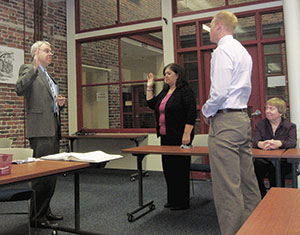
Cindy Hickey and Rob King were sworn in last week as new members of Commission for Persons with Disabilities. – Photo by Douglas Yu
By Douglas Yu
In Somerville, disabled people have a long history of fighting for full accessibility to the facilities, non-discriminatory treatments in all walks of life and equality of human rights.
The Director of Council on Aging, Cindy Hickey, and the Director of Engineering of City of Somerville, Rob King, were sworn in to join the Commission for Persons with Disabilities at a public hearing on Tuesday. They joined an attempt to come up with fresh ideas to help fight discrimination against disabled people.
“A lot of projects that I touched on were brought up from disabled people’s standpoints,” King said. “I just want to get involved, so I can guide discussions and answer questions.”
One of the things that the Commission is struggling with right now is getting the minimum requirement of five people to give a presentation, King said.
That number is closer to being reached, since a lifelong Somerville resident, Kathy Paige’s Commission membership application was being reviewed. She had a sound reason for joining.
“My husband is an example,” Paige said. “When he tried to walk across the street one day near Davis Square, all the cars stopped. But the bikes just zoomed through the road and hit him. It was terrible.”
Complaints about the bikes and even skaters causing dangers to people with disabilities have been going on for years, according to Denise Provost, the Representative of the 27th Middlesex District in Massachusetts.
“Some bills I filed are to make the roads safer for pedestrians, for people who use walkers, wheelchairs,” Provost said. “I’ve heard a lot over the years, complaints about the crosswalks in Davis Square, how they are unsafe, particularly for people who are frail or unsteady.”
Provost mentioned that some Boston suburbs, such as Medford and Braintree had already passed bills to reduce the speed limit for all vehicles, including bicycles. “These enforcements are very necessary. They make people feel at least objectively safer,” Provost said. “A neighbor of mine had his foot broken by a bicycle. It was awful.”
There were five to six thousand bills relevant to disabled people that were filed between the two branches of state legislature, but they might not be filed in the same committee, according to Provost.
“There is a Committee of Mental Health,” Provost said. “Sometimes, the bills are sent to the Committee of Public Health. No one’s testimony is more preferred than others’. And House clerks will decide which bills can be passed.”
Provost said it was unnecessary for disabled people in Somerville to file bills at the state house. Instead, they can send emails to the Commission of People with Disabilities.
Sixty-five-year-old Marie McBride moved to Somerville in 1978. She has been doing community work as a disability consultant for 20 years. Hidden disabilities and mental health were her biggest concerns.
“There are no people for disabled people to fall back on and ask for help,” McBride said. “Mental health disability is pretty bad in Somerville. We need to care more about brain injures and teenage suicides. Kids do damaging things to themselves.”
McBride thought it was “a shame and tragedy” for government officials to take away the Welfare Office at Davis Square and the Social Security Office.
“We need places that people can go into and ask for help,” McBride said.
Out of all the unfair situations that may happen to the disabled community at Somerville, Provost selected bills for the three that she thought were the most important.
House 144 is the title of a bill affirming the inclusion of the individuals with disabilities within civil rights protections and non-discrimination provisions in Massachusetts, according to Provost.
“Many people today still call disabled people handicapped,” Provost said. “So this bill makes an effort of going through all of the general laws, making the language consistent.”
House 1806 concerns the rights of persons receiving services from programs of facilities and the Department of Mental health, including right to fresh air in the outdoors, Provost said.
House 2057 addresses accessibility to medical equipment, Provost said. “As I listen to those testimonies, I found that people with a variety of disabilities were told ‘I’m sorry, we can’t find a wheelchair for you.’ They always receive minimal care or denial of care.”
The Coordinator and Director of the Somerville Office of Disabilities, Betsy Aolen, said the Commission was still accumulating the funds to make some of the facilities in Somerville more convenient for disabled people.
“We have a consultant for designing the city right now. There is also Somerville by Design. They are doing assessments of our buildings, parks and playgrounds,” Aolen said. Making buildings more accessible to disabled people “is definitely something that is recognized as priority.”
The Commission for Persons with Disabilities was established by Municipal Ordinance in 1992. Its stated goals are “to ensure that all persons living, working and visiting the City of Somerville have full and equal access to all programs and services within the city and to enable individuals with disabilities to achieve their full potentials.”
“Hopefully, there will be more people to join the Commission to bring the changes,” King said, “So the city can be more convenient for the disabled people.”












Reader Comments